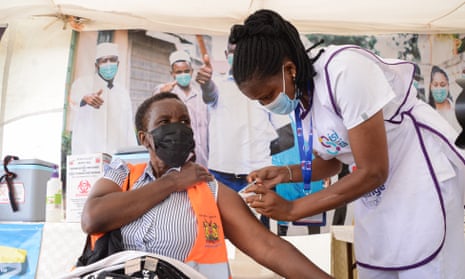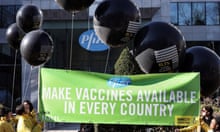Pfizer made nearly $37bn (£27bn) in sales from its Covid-19 vaccine last year – making it one of the most lucrative products in history – and has forecast another bumper year in 2022, with a big boost coming from its Covid-19 pill Paxlovid.
The US drugmaker’s overall revenues in 2021 doubled to $81.3bn, and it expects to make record revenues of $98bn to $102bn this year.
The bumper sales prompted accusations from campaigners of “pandemic profiteering”. The group Global Justice Now said the annual revenue of $81bn was more than the GDP of most countries and accused Pfizer of “ripping off public health systems”.
The Covid jab Comirnaty, which the New-York based pharma firm developed with the much smaller German company BioNTech, brought in $12.5bn in revenues in the final quarter of 2021, taking the total for the year to $36.8bn. Pfizer said it had exceeded its target of manufacturing 3bn doses of the vaccine last year.
The drugmaker made a net profit of nearly $22bn last year, up from $9.1bn in 2020. It increased its 2022 estimate for Comirnaty sales to $32bn and expects Paxlovid to contribute $22bn in revenues.
The pill, which boasts nearly 90% success in preventing severe illness among vulnerable adults if taken soon after becoming infected with Covid-19, was approved for emergency use by the US regulator in late December.
A few days later, Paxlovid received the green light in the UK, where the Medicines and Healthcare products Regulatory Agency described it as a “life-saving” treatment. It has now received emergency approval in 40 countries.
Albert Bourla, Pfizer’s chairman and chief executive, said that at the start of the pandemic it had “committed to use all of the resources and expertise we had at our disposal to help protect populations globally against this deadly virus”.
“Now, less than two years since we made that commitment, we are proud to say that we have delivered both the first FDA-authorised vaccine against Covid-19 (with our partner, BioNTech) and the first FDA-authorised oral treatment for Covid-19,” he said.
“These successes have not only made a positive difference in the world, but I believe they have fundamentally changed Pfizer and its culture for ever.”
The Covid vaccine, together with that produced by US rival Moderna and the much cheaper jab made by Britain’s AstraZeneca, has saved millions of lives worldwide.
However, pharmaceutical companies have been accused of not sharing the recipe for their vaccines, which would enable drugmakers in poorer countries to produce cheaper versions of them.
Global Justice Now pointed out that Pfizer’s Covid-19 jab was invented by BioNTech, supported by €100m (£84m) in debt financing from the publicly owned European Investment Bank and a €375m grant from the German government.
Tim Bierley, a pharma campaigner at the group, said: “The development of mRNA vaccines should have revolutionised the global Covid response.
“But we’ve let Pfizer withhold this essential medical innovation from much of the world, all while ripping off public health systems with an eye-watering mark-up.”
Moderna has said it would not enforce patent protection on its Covid vaccine, and last week scientists in South Africa said they had developed a copy of the jab. They hope it will boost vaccination rates across the continent, which are among the lowest in the world.
Bierley said: “It’s nothing short of pandemic profiteering for Pfizer to make a killing while its vaccines have been withheld from so many. Pfizer is now richer than most countries; it has made more than enough money from this crisis. It’s time to suspend intellectual property and break vaccine monopolies.”
Pfizer has charged the UK’s NHS an estimated £2.8bn above production cost for the 189m doses of Covid-19 vaccines the UK government has bought, Global Justice has calculated.
According to Reuters, Pfizer has sold the vaccine to African countries at $3 to $10 a shot. It has indicated that a non-profit dose costs just $6.75, or £4.98, to produce, but it has reportedly charged the NHS £18 a dose for the first 100m jabs bought and £22 a dose for the next 89m, totalling £3.76bn, Global Justice Now said – amounting to an eye-watering 299% mark-up.
Responding to Global Justice Now’s claims, a Pfizer spokesperson said it was “firmly committed to equitable and affordable access” to the Comirnaty jab.
They said: “High- and middle-income countries pay more than low-income countries, but at a value that is significantly discounted from our normal benchmarks, during the pandemic. Low- and lower-middle-income countries pay a not-for-profit price.
“However, we would highlight that the true costs of bringing this novel mRNA vaccine to patients include ongoing large-scale clinical studies and pharmacovigilance, continued and increased manufacturing efforts including process improvements, and global distribution and supply.
“Covid vaccines are complex biologic products, and their manufacturing requires specialised experience, expertise and equipment.
“It is not as simple as sharing the ‘recipe’. Manufacturing of the Pfizer and BioNTech Covid vaccine involves the use of over 280 materials. There is enormous collaboration already taking place.”








